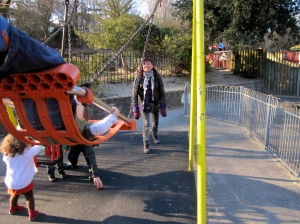Monday, 17 March 2014
Animation of my Swenglish poem
Adriana Sabau who is working on the documentary of the Swenglish project has made a cool animation of an extract from my "Swenglish-poem".
PÅ SVENSKA
Saturday, 1 March 2014
Question 17: Do you Want to have Children?
 No biological clock
No biological clockThanks to the Swenglish-project I started liking kids for real, but I wasn't really inspired to have my own ... Mostly because my books and poems are my babies, and I've never felt that biological clock ticking. (Perhaps it will change when I'm 40, who knows ... ) Anyway, I enjoyed spending time at playgrounds and reading books for kids, but perhaps not every day ...
Planned or Not Planned
5 of 15 participants in England had children and the figures were the same in Sweden. But in England 1 person was a bonus parent and 1 parent had thought she wouldn't become a parent because of medical conditions. And 1 of 5 in Sweden had not planned to have children at all.
"Well, it just happened, I didn't even know that I was pregnant ... But now I'd never want to be without having children. If it hadn't happened, I would perhaps never have had children ... I've never had a natural longing for kids. I've never wanted children or a family in that way, the way you should be, like what the norm is. But when I became pregnant, I wanted that kid at all cost."
Artist instead of a Parent
Out of the 10 people in England who did not have children, there were only 3 who wanted kids, 4 were hesitant and 3 said no. In Sweden 10 out of 10, who did not have children, wanted them. This difference is perhaps due to the fact that the ones who were hesitant or didn't want kids in England were engaged in different creative projects and/or didn't feel stable enough in their lives.
One person in England said this about the kid question: "When I was 36 I sat down and thought it through: I'd rather be an artist and put my creative energy into that."
However, 4 of 5 parents in England and 1 of 5 parents in Sweden were both parents and engaged in creative projects.
Unconditional love, but hard work
I also asked the people who had kids what the best and what the most difficult thing was about being a parent. Here are some selected answers:
"The best is that they're funny, we laugh a log, they are both very cuddly, but they are tiring, I suppose it kind of even itself out, they make you understand your parents more."
"It feels like it's a real love, it's completely unconditional. You become a better person, you understand what it's like loving someone. You learn a certain amount about human beings. You learn to love human beings a bit more. All human beings started as good, full of love, then they get a bit twisted and changed by society ... The most difficult thing is that it's hard work. You don't have a lot of time. And once you have children you're going to worry about them for the rest of your life. You feel less free even if you understand love better. They're not necessarily gonna love you back though ..."
Different wants
Many of the ones who didn't have kids but wanted kids, felt very emotional about not having them yet. In some cases it was due to their partner (either sex) not wanting children or that they were single and started to feel they were too old. 2 of the parents in England and 2 of the parents in Sweden were single parents, something they had mixed feelings about. 1 person in Sweden had considered getting children on her own, but hadn't really pushed the idea, and another person said she was just as positive to adoption as to having her own kids.
This study is by no means scientific, the answers are based on interviewing 15 people in England and 15 people in Sweden, aged 22-59. A majority are heterosexual women, but there are a few men and some LGBT people in the study as well. Look out for the next question: What do your friends mean to you?
PÅ SVENSKA
PÅ SVENSKA
Subscribe to:
Comments (Atom)
